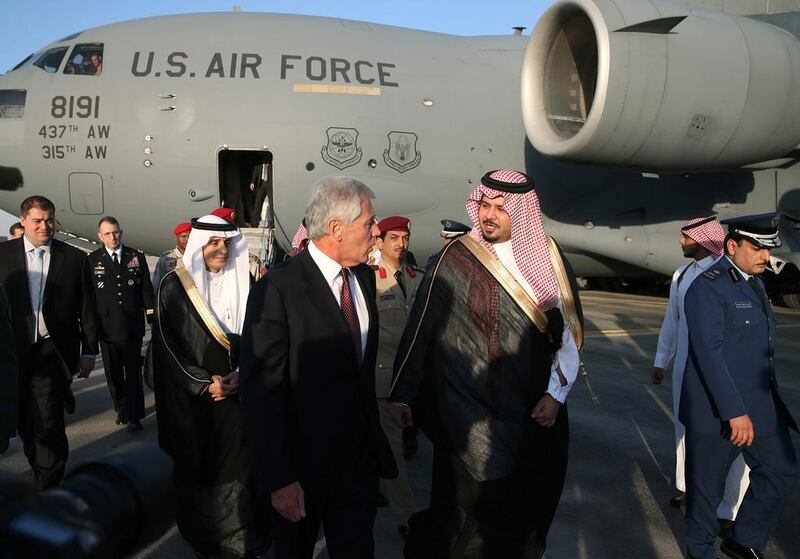NEW YORK // Although America’s top defence official has encouraged more coordination among the country’s Gulf allies, it is widely believed in Washington that closer security cooperation among members of the Gulf Cooperation Council (GCC) will not occur soon, as differences persist over how to respond to a possible long-term deal on Iran’s nuclear programme.
The US defence secretary, Chuck Hagel, was in Doha yesterday for talks with Qatari officials, winding up a regional tour that included Manama and Riyadh and was aimed at reassuring allies that the US administration has no intention of abandoning them, even as it turns more attention to Asia and seeks to build on the interim accord reached between Tehran and major international powers last month.
While any peaceful solution to the decade-old dispute over Iran’s nuclear programme will not eliminate the need for the military capability to respond to Iranian threats, the GCC will not become in the near future the sole guarantor of security in the Gulf, US-based analysts suggest.
“I think in Washington there’s no great hope that there is going to be a union on the model that the Saudis have talked about because we’ve heard these calls before,” said F Gregory Gause, a professor of political science at the University of Vermont and a senior fellow at the Brookings Doha Center. “They don’t see it as particularly significant.”
Gulf leaders have been worried that the US-led negotiations with Iran to end what most world powers consider a nascent nuclear weapons programme will free Tehran to pursue regional policies that threaten Gulf Arab interests as the US focuses on other parts of the world.
The GCC was established in 1981 to foster political, economic and security ties among Saudi Arabia, the UAE, Bahrain, Qatar and Oman. Efforts to promote deeper integration – notably, the call for political unification by Saudi Arabia’s King Abdullah at the 2011 summit – have been resisted by some of the bloc’s own members.
Nevertheless, speaking in Manama on Saturday, Nizar Madani, Saudi Arabia’s assistant foreign minister, repeated Riyadh’s plea for the creation of “one political entity in order to face internal and external challenges.” The subject is expected to be on the agenda of the two-day annual summit of the GCC, which runs through today.
Mr Hagel has underlined the US administration’s position that it has no plans to cede responsibilities for protecting vitals oil-shipping lanes in the Gulf if a deal is struck and that it views a multilateral sharing of the security burden among the GCC as a step toward the interests of the Gulf and the US.
“We would like to expand our security cooperation with partners in the region by working in a coordinated way with the GCC, including through the sales of US defence articles through the GCC as an organisation,” he said on Saturday. “This is a natural next step in improving US-GCC collaboration.”
But Mr Hagel’s trip may not have been enough to calm Gulf jitters. He is the most senior US official to visit the region since the interim nuclear deal was agreed to in Geneva last month but is not seen as particularly close to the US president, Barack Obama, whose White House tightly controls policy, according to Simon Henderson, the Gulf and Energy Policy Program at The Washington Institute for Near East Policy.
“And he may have inadvertently sent mixed signals on Iran, urging the GCC to buy into a collective missile defence agreement — a move implying that Iran is a continuing threat — at a time when Washington is emphasising optimism on the nuclear issue,” Mr Henderson added.
Despite recent efforts by Tehran to signal a new chapter in GCC-Iranian ties — including visits by Iranian Foreign Minister Mohammed Javad Zarif to Kuwait, Qatar, Dubai, and Oman — Gulf Arab governments remain leery of Iran’s intentions in the region, where they see it fomenting unrest in Syria, Lebanon, Yemen and Bahrain, and they all seek a greater role in the nuclear negotiations, Mr Gause said.
Saudi officials in particular do not think the US is seriously taking into account Gulf interests and appear to be attempting an alignment of the GCC states’ Iran strategies. “I think that [the call for a union] is to some extent part of the Saudi strategy for dealing with Iran, not just in light of the nuclear deal but more generally,” Mr Gause said.
Yet even if there is shared frustration with Washington’s sometimes poorly communicated stance, the Iran question shows that the GCC states have diverging interests when it comes to economics and individual foreign policies.
The smaller Gulf Arab countries are unlikely to line up behind Riyadh, who has so far been less willing to engage Iran, even as it has offered reserved support for the negotiations.
For its part, Kuwait views Iraq as its greatest security challenge, while Qatar, which already has differences with Saudi Arabia over the Muslim Brotherhood and Egypt, shares the Northern Dome gasfields with Iran.
Meanwhile, the UAE has lost nearly $20 billion (DH734 billion) in trade with Iran due to economic sanctions, and is engaged in the most serious recent negotiations with Iran over the UAE-claimed islands it occupies.
“The Gulf states all have really good relations with the US and they can represent their own fears and hopes in these negotiations directly to Washington” without Saudi help, Mr Gause said.
“I just don’t see them joining in as junior partners to a big union in which Saudi Arabia will be the leader,” he added. “I think they like the GCC the way it is.”
tkhan@thenational.ae





